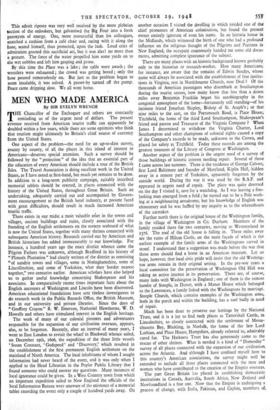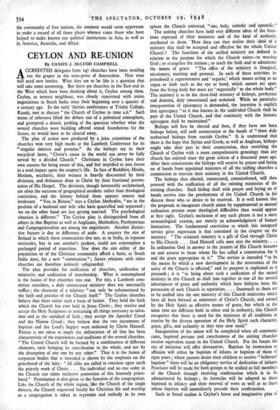MEN WHO MADE AMERICA By SIR EVELYN WRENCH T HE Chancellor
of the Exchequer and others are constantly reminding us of the urgent need of dollars. The present revenue received from American tourist traffic can apparently be doubled within a few years, while there are some optimists who think that tourism might ultimately be Britain's chief source of currency from the United States.
One aspect of the problem—the need for an up-to-date survey, ,county by county, of all the places in this island of interest to Americans—deserves special attention. Such a survey should be followed by the " projection " of the idea that an essential part of the education of every American should include a tour of the British Isles. The Travel Association is doing excellent work in the United States, as I have noted at first-hand, but much yet remains to be done. In addition to a long-term publicity campaign, suitably inscribed memorial tablets should be erected, in places connected with the history of the United States, throughout Great Britain. Such an undertaking, adequately carried out and accompanied by Govern- ment encouragement to the British hotel industry, at present faced with great difficulties, should result in much increased American tourist traffic.
There exists in our midst a mot valuable asset in the towns and villages, ancient buildings and ruins, closely associated with the founding of the English settlements on the eastern seaboard of what is now the United States, together with many shrines connected with subsequent American history. Research carried out by American and British historians has added immeasurably to our knowledge. For instance, a hundred years ago the exact district whence came the Pilgrim Fathers was unknown, although Bradford in his history of Plimoth Plantation" had clearly written of the district as consisting "of sundrie towns and villages, some in Notinghamshire, some of Lincollinshire, and some of Yorkshire, wher they border nearest together," two centuries earlier. American scholars have also helped us to gather useful knowledge concerning Shakespeare and his associates. In comparatively recent times important facts about the English ancestors of Washington and Lincoln have been discovered. American educational foundations have sent tireless investigators to do research work in the Public Records Office, the British Museum, and in our university and private libraries. Since the days of "Geoffrey Crayon" R. W. Emerson, Nathaniel Hawthorne, W. D. Howells and others have stimulated interest, in the English heritage.
• The work of many of our colonial pioneers and adventurers responsible for the expansion of our civilisation overseas, appears, alas,. to be forgotten. Recently, after an interval of many years, I went to East London to revisit the wharf in Blackwall whence sailed, on December 19th, 16o6, the expedition of the three little vessels 'Susan Constant, 'Godspeed' and Discovery,' which resulted in the establishment of the first permanent English settlement on the mainland of North America. The local inhabitants of whom I sought information had never heard of the event, and it was only when I applied to the Head Librarian in the Poplar Public Library that I found someone who could answer my questions. Many instances of local ignorance could be given. In a West Country town from which an important expedition sailed to New England the officials of the local Information Bureau were unaware of the existence of a memorial tablet recording the event only a couple of hundred yards away. On
another occasion I visited the dwelling in which resided one of the chief promoters of American colonisation, but found the present owner entirely ignorant of even his name. In an historic house in the Midlands, which witnessed the birth of one who had a profound influence on the religious thought of the Pilgrims and Puritans in New England, the occupant courteously handed me some old docu-,. ments, admitting complete ignorance of the subject.
There are many places with an historic background known probably only to the historian or research-worker. How many Americans/ for instance, are aware that the remains of Edwin Sandys, whose name will always be associated with the establishment of free institu- tions in Virginia, rest in Northbourne Church, near Deal ? Of the thousands of American passengers who disembark at Southampton during the tourist season, how many know that less than a dozen miles away Benjamin Franklin began his autobiography in the congenial atmosphere of the home—fortunately still standing—of his intimate friend Jonathan Shipley, Bishop of St. Asaph's ; or that nine miles to the east, on the Portsmouth Road, is Place House,' Titchfield, the home of the third Lord Southampton, Shakespeare's friend and patron and Treasurer of the Virginia Company ? When James I determined to withdraw the Virginia Charter, Lord Southampton and other champions of colonial rights caused a copy of the Company's records to be made, unknown to the Crown, and placed for safety at Titchfield. Today these records are among the greatest treasures of the Library of Congress at Washington.
Another aspect of the problem is the urgent need of a survey of, those buildings of historic interest needing repair. Several of these I came across last summer. There is the residence of George Calvert; first Lord Baltimore and founder of Maryland, Kiplin Hall, hidden away in a remote part of Yorkshire, apparently forgotten by the outside world. During the war it was used by the R.A.F. and appeared in urgent need of repair. The place was quite deserted on the day I visited it, save for a watchdog. As I was leaving a fine- looking man emerged from a field ; he turned out to be a Pole work- ing at a neighbouring aerodrome, but his knowledge of English was elementary and he was baffled by my inquiry as to the whereabouts of the caretaker.
Further north there is the original house of the Washington family, in the village of Washington in Co. Durham. Members of the family resided there for two centuries, moving to Westmorland in 1376. The roof of the old house is falling in. Three miles away are the ruins of Hilton Castle, on the main façade of which is the earliest example of the family arms of the Washingtons carved in stone. I understand that a suggestion was made before the war that these arms should find a home in an American museum. Let us hope, however, that local civic pride will insist that the old Washing- ton arms remain in their original setting. In the pre-war years a local committee for the preservation of Washington Old Hall was taking an active interest in its preservation. There are, of course, many links with Washington in England ; one of them is the remote hamlet of Steeple, in Dorset, with a Manor House which belonged to the Lawrences, a family linked with the Washingtons by marriage. Steeple Church, which contains examples of the Washington arms, both in the porch and within the building, has a roof badly in need of repair.
Much has been done to preserve our heritage by the National Trust, and it is a joy to find. such places as Tattershall Castle, in Lincolnshire, so closely connected with the settlement of Massa- chusetts Bay, Blickling, in Norfolk, the home of the late Lord Lothian, and Place House, Hampshire, already referred to, admirably cared for. The Harkness Trust has also generously come to the rescue of other shrines. What is needed is a kind of " Domesday " survey of all places connected with the expansion of our civilisation' across the Atlantic. And although I have confined myself here to this country's American associations, the survey might well be extended to include all those places connected with the men and women who have contributed to the creation of the Empire overseas.
The part Great Britain has placed in establishing democratic institutions in Canada, Australia, South Africa, New Zealand and Newfoundland is a fine one. Now that the Empire is undergoing a process of change, with India, Pakistan, and Ceylon, members di the community of free nations, the moment would seem opportune to make a record of all those places whence came those who have helped to' make known our political institutions in Asia, as well as in America, Australia, and Africa.



































 Previous page
Previous page